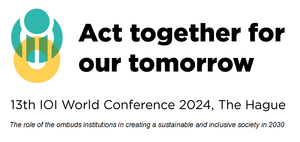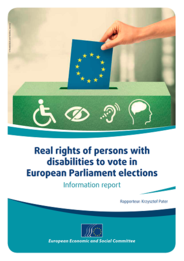This report presents the state of play of the implementation of the right of European Union (EU) citizens with disabilities to vote in elections to the European Parliament (EP).
The European Economic and Social Committee (EESC), an EU advisory body, believes it has a duty, in the run-up to the EP elections, to provide EU institutions, Member States and EU citizens with a full picture of how this right is actually implemented. The EESC hopes that at the next elections in 2024, no EU citizen will be deprived of their right to vote because of their disability.
The data for this report was provided by several hundred people, representing a significant number of institutions and organisations from 27 Member States – mostly public authorities in Member States responsible for the election process and organisations representing or supporting persons with disabilities, but also members of the European Parliament from the Disability Intergroup and representatives of the European DisabilityForum (the United Kingdom was not considered as it will leave the EU on 29 March 2019, before the 2019 European Parliament elections).
In conclusion, the report notes – among others – that in each of the 27 EU countries, there are laws or organisational arrangements which exclude some voters with disabilities from participating in EP elections. About 800 000 EU citizens from 16 Member States are, on account of national rules, deprived of the right to participate in EP elections because of their disabilities or mental health problems. The extent of this phenomenon is very uneven across individual countries.
The full report is available in English, French and Spanish and can be accessed further down below.
Source: European Network of Ombudsman (ENO)
 Downloads
Downloads
-
EESC - Real rights of persons with disablities to vote in European Parliament elections – Information Report (March 2019) (391,5 KiB)

-
CESE – La réalité du droit de vote aux élections européennes pour les personne handicapées (mars 2019) (436,0 KiB)

-
CESE - El derecho real de voto en las elecciones al Parlamento Europeo de las personas con discapacidad (marso 2019) (403,7 KiB)



